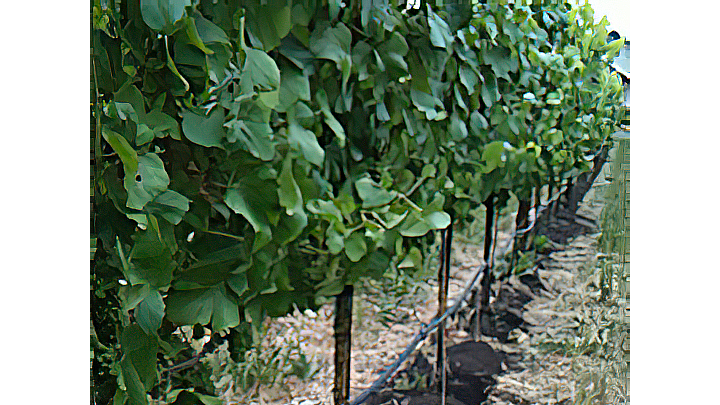Four Course Compost anyone? Melon skin, steak bones, red peppers and pasta on the menu for some of California's best fed vines.
Richard Craig discovers how natural winemaking is completing the green loop: from the farm to the restaurant kitchen and from the kitchen back to the vineyard that produces the wine that goes back to the restaurant!
Whilst researching for an article for Gilbert& Gaillard Wine International Magazine on Californian Wine, I came across and tasted the wines of Inman Family Vineyards. They are a small, 1800 cases of Pinot Noir, 280 cases of Pinot Gris, eco-friendly producer in the American Viticultural Area of Russian River Valley, Sonoma County.
Viticulturalist and Winemaker, Kathleen Inman is at the forefront of sensitive farming and natural winemaking that are environmentally responsible. Modern farming techniques often emphasise production at the expense of soil health and ecosystem integrity. Kathleen works tirelessly to solve every farming need at her organic Olivet Grange Vineyard, not only to produce excellent quality wine grapes, but also to preserve and enrich her environment.
At the cornerstone of her sensitive farming is “The Four Course Compost Programme” so named because the compost was derived from table scraps discarded by high end San Francisco hotels and restaurants. 500 tons of food scraps are collected daily in the San Francisco area from over 2000 restaurants and now from residents as well. Food scraps account for 19% of the city’s solid waste and it now has a “pay as you throw” policy where restaurants are given 23 gallon containers and receive a discount for separating food waste from other waste. These are collected by bio-diesel green carts and the contents are sorted and loaded in to an industrial sized grinder. It is then mixed to a recipe; “ it contains melon skin, steak bones, red bell peppers and pasta from North Beach restaurants and fish heads, bones and skin from Fisherman’s Wharf,” says Robert Reed of Norcal Waste Systems. It is then cooked at a high temperature which is maintained and monitored to eradicate any undesirable micro-biological life, matured for 90 days in windrows before being distributed. Sounds almost good enough to eat!
Four Course Compost is now used by over 200 grape growers in Northern California and many more other fruit and vegetable growers. Currently 150 cubic yards of Four Course Compost per day are distributed to the North Coast growers. It is estimated that since its inception, the programme has prevented the release of 137,000 tons of methane gas into the atmosphere from land fill sites and has allowed 18,500 tons of carbon dioxide to be returned to the soil. This is equivalent to re-foresting 35 square miles of sustainable forest for 23 years or offsetting emissions from every vehicle crossing the Bay Bridge for 311 days. Surely we should all be doing this!
Every Spring, Kathleen Inman spreads 350 cubic yards of the compost as a mulch, 12 inches wide and 3 inches deep on to her Olivet Grange Vineyard. The mulch, to which she adds corn meal, adds nitrogen to her soil and acts as a natural herbicide reducing the need for other, all be it organic, treatments. It helps to encourage cover crop growth between the vine rows which makes the vines compete with other flora for nutrients and hence produce smaller, more flavoursome berries. Healthy micro-biological activity flourishes, making micro nutrients more available to plant roots; soil structure and water retention are improved and this reduces soil erosion and the need to irrigate quite so much.
In addition to Four Course Compost, Kathleen adds worm casts which are rich in nitrogen, phosphorus and potassium. She also makes a “tea” from worm casts which is fed to the vines through the irrigation drips three times a year adding a diverse spectrum of beneficial micro-organisms that improve the health of the soil and the vines and aids the vines' natural resistance to diseases and pests. In 2009 she spread wild flower seeds around the perimeter of the vineyard block to attract beneficial insects and built homes and resting places for owls to reduce the gopher population that attack the vines from beneath the soil. Only as a last resort are organic pesticides and fungicides used. In 2005 she began to augment their organic viticulture with some biodynamic farming techniques using the lunar calendar to make decisions on pruning, thinning and harvesting.
The Inman Family are making a high quality product from the land which, in contrast to many other human activities, is not stripping the natural resources from our planet but actually putting them back with interest. As Kathleen Inman says of the Four Course Compost Programme, “it completes the loop, food goes from the farms to the restaurants' kitchens and from the kitchen the waste goes back to the vineyard that produces wine that goes back to the restaurant.” I would say that this is an extremely efficient use of resources.
When you buy a bottle of Inman Family Pinot Noir or Pinot Gris, you are buying a piece of your environment. Quality producers such as these are challenging and overhauling the exploitative methods of the past and, in their hands, the future looks effervescent. One hopes that their lead is followed by the agricultural community as a whole.
Inman Family Wines can be purchased in the UK from Bibendum Wines Ltd.


